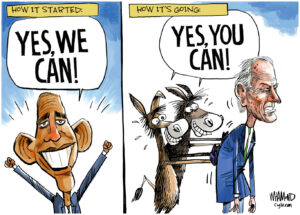Washington’s Overrated ‘Old Hands’
The strongest argument for Obama is the weak performance of the Republican regime's vaunted "grown-ups," including McCain and his advisers. They have gone far in proving that experience can be overrated.Barack Obama knows which countries border Iraq; he understands the difference between Shiite and Sunni; and he is probably aware that Czechoslovakia no longer exists — but as John McCain complains, the young senator has “no military experience whatsoever.” Indeed, like both of the last two presidents, Sen. Obama possesses scant credentials in national security and foreign policy.
Why, then, does he appear increasingly plausible as the next president? Assurance, grace and mastery of the facts have helped to lift his stature, as did his daring decision to venture abroad, directly challenging his older opponent’s perceived strength. But granting his talent and initiative, the strongest argument for the Democrat is the weak performance of the Republican regime’s vaunted “grown-ups,” including McCain and his advisers. They have gone far in proving that experience can be overrated.
Following the 9/11 attacks, conventional commentary constantly informed Americans that we were lucky to be led at that perilous time by the old Republican hands in the Bush White House. Not George W. Bush himself, of course, whose résumé featured an abbreviated stint in the Texas Air National Guard and perhaps a few visits to Tijuana. We were supposed to thank providence for the wisdom and skill of Vice President Dick Cheney, Secretary of Defense Donald Rumsfeld, Secretary of State Colin Powell and National Security Adviser Condoleezza Rice, along with a phalanx of deputies, assistants and subalterns. They had won the Gulf War of 1991, and their presence in Washington dated back to the Nixon era. They would know what to do.
Nearly every decision those highly qualified individuals made, from the day they took over in 2001, has been wrong, starting with the dismissal of the al-Qaida threat and moving on to the invasion of Iraq; the diplomatic standoffs with Iran, North Korea and Syria; the sidelining of the Mideast peace process; and the unilateral impulse that has damaged American alliances around the world.
Rarely during the past seven years did Sen. McCain, whose own foreign policy skills and knowledge have begun to seem seriously overrated, speak up in dissent from the failed Bush policies. His most significant contribution to the national debate — namely, his insistence that the U.S. commit more troops to Iraq — is overshadowed by his much more consequential mistake of supporting the invasion on false pretenses. More than once he has displayed the same stubborn ignorance about Iraq, Iran and the Gulf region that led to this strategic disaster. They underestimated the division between Shiite and Sunni, the influence of Iran on the new leaders of Iraq and the resistance of the Iraqi people to any prolonged American occupation.
That persistent ineptitude has brought the supporters of the war to an ironic comeuppance, as the Iraqi government and people demand the withdrawal of U.S. troops on precisely the same timetable suggested by Sen. Obama. The bombshell remarks uttered by Prime Minister Nouri al-Maliki and his aides over the past several days should not be completely surprising to anyone who has paid attention to Iraqi public opinion or to the botched status-of-forces negotiations between the United States and Iraq.
As Juan Cole has pointed out, the Bush administration repeatedly irritated the Iraqis with their insistence that a new agreement ratifying the American occupation must continue to exempt private contractors and U.S. troops from prosecution under Iraqi law, and permit U.S. commanders to operate without consulting the Iraqi government, and arrest and imprison Iraqi terror suspects indefinitely. Those perceived outrages against Iraq’s sovereignty were underlined by an American operation in the prime minister’s hometown that evidently killed one of his cousins.
The net result of the status negotiations is no result, which has made the Iraqi government highly susceptible to pressure from its own people and from its friends in Tehran for an end to the occupation. Attempts by the Bush White House and the McCain campaign to suggest that the Iraqis didn’t mean what they had plainly said only provided a darkly comical coda.
But then the Iraq war has always been a saga of incompetence and ideology, compounded by deception and self-deception. Against that lethal mixture, the experience of the old hands seems to have provided no protection, for them or for the rest of us.
Joe Conason writes for the New York Observer.
© 2008 Creators Syndicate Inc.
Your support is crucial…With an uncertain future and a new administration casting doubt on press freedoms, the danger is clear: The truth is at risk.
Now is the time to give. Your tax-deductible support allows us to dig deeper, delivering fearless investigative reporting and analysis that exposes what’s really happening — without compromise.
Stand with our courageous journalists. Donate today to protect a free press, uphold democracy and unearth untold stories.









You need to be a supporter to comment.
There are currently no responses to this article.
Be the first to respond.